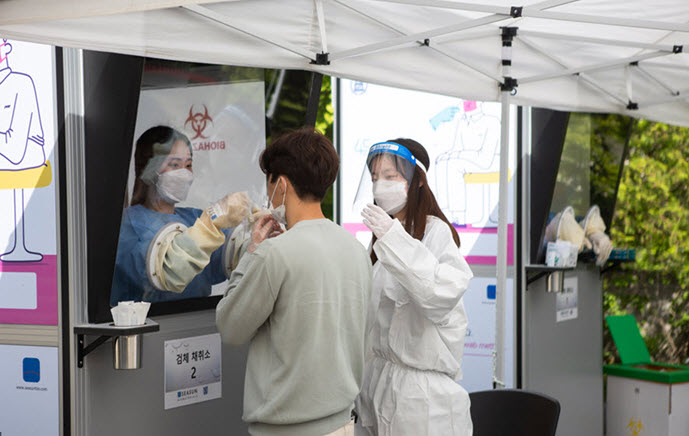
SNU's COVID-19 testing facility
Q. What is the SNU rapid COVID-19 test?
A.It is an SNU-led initiative to facilitate a more effective response to the spread of the coronavirus. Without outsourcing, the university has developed a point-of-care testing system that starts analyzing results within two hours after taking samples from patients.
Q. What is the difference between a rapid antigen test and a rapid molecular test?
A.A rapid antigen test tests for the presence of proteins secreted by a virus, and is similar in principle to commercially available pregnancy tests. The amount of antigen cannot be amplified, unlike mRNA or DNA, and thus cannot be detected if present at very low levels. By contrast, a molecular test tests for the presence of RNA molecules specific to the virus, and through amplification trace levels of virus RNA can be detected, thereby accounting for the presence of the coronavirus even in asymptomatic individuals. The specificity and sensitivity of SNU test is well over 95% each.
Q. Why has SNU implemented the rapid COVID-19 test?
A.The university hopes that the recently implemented diagnostic tests will contribute towards the return to a ‘normal’ college environment. With the test facilities, SNU will be able to expand its currently restricted educational and research facilities in accordance with regulations guided by the Korea Disease Control and Prevention Agency (KDCA) and Central Disease Control Headquarters (CDCH). If our school’s approach is successful, it could be implemented at other universities and in elementary, middle and high schools.
Q. Who can receive the SNU rapid COVID-19 test?
A.All university members will be able to receive testing. As of May 2021, all members of the SNU community are eligible to receive the COVID-19 rapid test. Testing facilities are available near building 25-1 and 301. Students and faculty can receive testing from 9:30am to 4pm after registering via the SNU app.
Q. What are the differences between testing at school and in hospitals or public health centers?
A.Tests offered by the university are not recognized as an official coronavirus diagnostic test by the government, and thus serve as a preemptive measure to identify individuals suspected of carrying the coronavirus. SNU, in collaboration with the Gwanak Public Health Center, will allow individuals who test positive for the university’s tests to undergo PCR-based testing immediately afterwards.
Q. Is this test safe?
A.The test makes use of loop-mediated amplification (LAMP) technology, which has been approved by the FDA as a safe method of testing for COVID-19 and is currently being used at the Incheon International Airport for passengers. Stringent measures were implemented so that the school could accommodate the system in accordance with health and safety regulations.
Q. Does a negative test mean for certain that I do not have the coronavirus?
A.No. All tests have a certain margin of error for false negatives, in which an individual is positive for the coronavirus but test negative. Testing on a regular basis is the only way to overcome false negatives. Also, as it is possible to be negative at the time of testing, but to contract the virus afterward, one must always behave in accordance with health and safety protocol, regardless of the results of the diagnostic test.
Source: https://www.snu.ac.kr/coronavirus/guide?md=v&bbsidx=131761
Written by Cheesue Kim, SNU English Editor, cheesuerocket@gmail.com
Reviewed by Professor Travis Smith, Department of Asian Languages and Civilizations, tlsmith@snu.ac.kr

